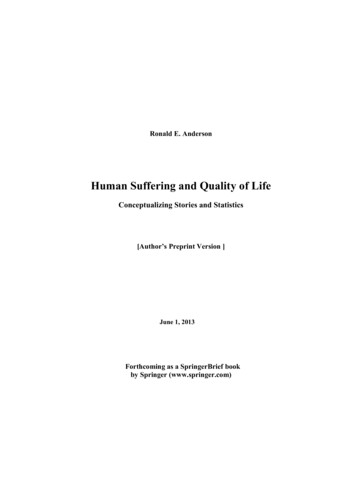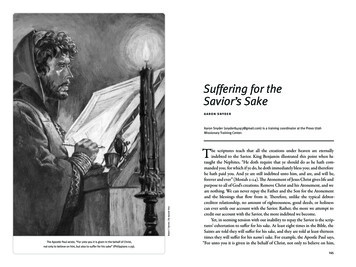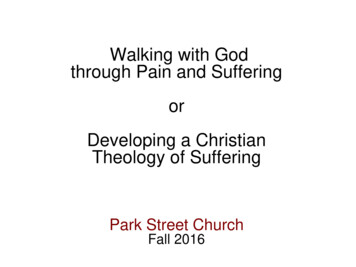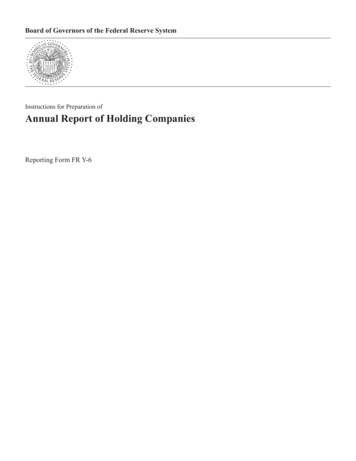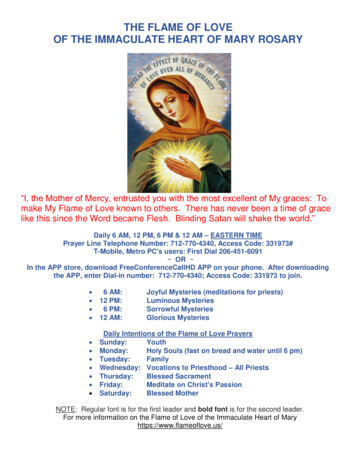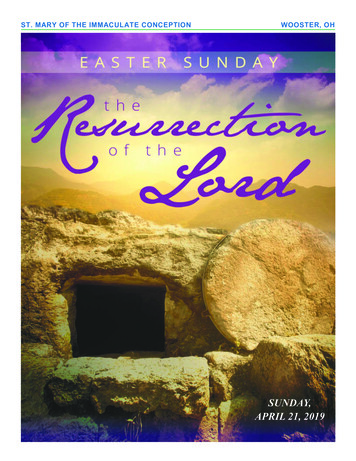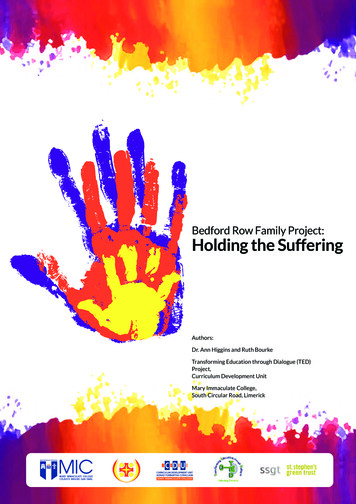
Transcription
Bedford Row Family Project:Holding the SufferingAuthors:Dr. Ann Higgins and Ruth BourkeTransforming Education through Dialogue (TED)Project,Curriculum Development UnitMary Immaculate College,South Circular Road, Limerick
Bedford Row Family Project:Holding the SufferingBedford Row Family Project:Holding the SufferingCopyright 2017,Curriculum Development Unit,Mary Immaculate College,LimerickISBN 978-1-900146-31-9Curriculum Development Unit,Mary Immaculate College,South Circular Road, Limerick,Ireland.T. 353.61.204366E.cdu@mic.ul.ieAll rights reserved. No part of thispublication, except photocopiablematerials in the Appendices, maybe reproduced, stored in aretrieval system or transmitted byany means, electronic, mechanical,including photocopying, scanning,recording or any other information storage or retrievalsystem, without the prior writtenpermission of the copyright andpublisher of this book. All photocopiable materials may be photocopied for classroom use only.Every effort has been made toacknowledge contributors andsources throughout this publication. If we have made anoversight, it is unintended and willbe rectified in future editions.As information posted on theInternet is constantly changing,web addresses may have becomeinactive or been modified sincethe time of publication of thisbook.
contentsContents .iForeword .ivAcknowledgements .vExecutive Summary .viSection 1 – Introduction .1Section 2 – Context: Imprisonment has many implications for families of prisoners and prisoners .2Introduction .31.Societal Context.43.Imprisonment.62.4.Family Context .4Transitioning out of prison.7Section 3 - Literature review.8Introduction.9Society, Crime and Imprisonment.9Prisoners .10Women in prison.11Men in prison.12Children of prisoners.13Families of prisoners .16Models of Family Support.17Introduction.17What is Family Support? .18Best practice in Family Support .19Categories of Family Support .20Supporting prisoners who are parents and their children .21Reintegration /transition back into society.22Conclusion .23Section 4 - Methodology.24Research aim.25Research approach and methodology .25Research questions .26Data Analysis .26Data Collection .26Ethical Considerations .28I
Bedford Row Family Project:Holding the SufferingSection 5 – Bedford Row Family Project Model of Delivery.30Introduction .31Underlying Ethos and Culture of the Bedford Row Family Project.31Model of service delivery.321.Organic evolution of services .333.Suite of integrated services .342.4.5.6.7.8.9.Multi-site delivery .33Family orientated and intergenerational .36Working in partnership with other organisations .37Accessibility .38Leadership and staffing .41Volunteers and student placement .42Training programmes .4210. Opportunities for creativity and self-expression .4211. Understanding gender differences in how people experience imprisonment.43Section 6 - Impact of Engagement .44Introduction .45Impact of engagement for children.45Children’s perspectives on the impact of engagement of attending the BRFP Children’s Club .45Parents' / carers', staff and external interviewee’s perspectives on the impact of the BRFP on children:Preventative element for children.47Impact of engagement on families.48Impact of engagement for adult service users .511.Opportunities for adults to engage in a variety of activities .513.Empowerment and transformation of adults .532.4.5.6.7.8.9.Addiction support.52Peer support, friendship, and solidarity for adults .56Building resilience, well-being and positive mental health in adults.58Preventive approach for adults.60Support for adults in prison and with their transition from prison to home .60Support for people/families with a loved one in prison and in transition out of prison.62Hope.63Impact of the Hospitality Centre for children and adults .64Impact of the BRFP on the prison environment .67Section 7- Suggested improvements to BRFP by research participants.70Introduction .71Supports and services for children.71Supports and services for adults.73Supports for families.74II
Supports for volunteers.74Supports for staff and internal operational considerations.75Buildings and infrastructure .76Funding and fundraising .78Partnership and working with external organisations.78Section 8 – Conclusions and recommendations.80Conclusions .81Recommendations.82Appendix 1 - List of organisations that the BRFP work with .85Bibliography.88List of TablesTable 3.1Table 3.2Table 7.1Table 7.2Table 7.3Interviews, focus groups and number of participantsMember check focus groups and number of participantsHow to improve BRFP – Supports and services for childrenHow to improve BRFP – Support and services for adultsHow to improve BRFP – Buildings and infrastructureList of AbbreviationsBRFPBedford Row Family ProjectCDIChildhood Development nvention on the Elimination of Discrimination Against WomenDelivering Equality of opportunity In SchoolsHome School Community LiaisonIrish College of Humanities and Applied StudiesIrish Penal Reform TrustIrish Prison ServiceLimerick College of Further EducationLimerick Institute of TechnologyLimerick Regeneration AgencyMary Immaculate CollegeMIRECMary Immaculate Research Ethics CommitteeUCCUniversity College CorkPALLSProbation and Linkage in Limerick SchemeIII2627727377
forewordIn Bedford Row we have an old saying that ‘we started with a kettle’ in 1999, and indeed we did, in what was thena pre-fab where visits were processed, just outside Limerick Prison!But of course we could not have begun at all without the foresight of the Mercy Sisters, the Franciscan Friars,the Governor and Officers of Limerick Prison, and most importantly families, who in 1999, embarked on a journeyof trust, and a collective belief that by working together we can bring about change.When the Project first began I was very excited by the approach, that is, meeting people ‘where they were at’before visiting their loved one in prison – a very simple yet effective way towards alleviating the distress thatfamily members feel at that time. However, I really began to know, appreciate and love the Project when Iattended a conference entitled Help Is At Hand organised by the redoubtable and inspiring Sr. Peggy Collins inUniversity of Limerick in 2003. As well as the difficulties that families face, the conference described, andincluded examples of how, members of families affected by imprisonment changed their own and their families’lives for the better.Following the Help Is At Hand Conference, our research Voices of Families Affected by Imprisonment, launched in2008, gave the Project a firm mandate to protect children by harnessing the wisdom and strength of familymembers while supporting them through the challenges that they experience every day. It was indeed a greatprivilege for me to take over as Project Leader from Sr. Peggy in 2007. And in the best tradition of Bedford Row,the Staff and Board met me where I was at! Getting to know the ropes at Bedford Row was exciting and energising. I knew that I was in a special place, inspiring, provocative, creative and warm, but above all faced the challenges of imprisonment and all that goes with it with a progressive outlook, good humour and positivity.Our Voices research posited the extent of the suffering of family members as they experience the imprisonmentof a loved one. This suffering may be intensified by the lack of hope that anything will change and the seemingendlessness of it all. And we all know that when we suffer too much there is a risk that we lose faith in our abilityto determine our own destiny, and we may grow dependent on others to change our lives for us!The mention of ‘suffering’ brings me to this research, undertaken by the Transforming Education throughDialogue Project (TED), located in the Curriculum Development Unit of Mary Immaculate College (MIC). Theresearchers, Dr. Ann Higgins and Ruth Bourke, fully embraced the theme of the research, Holding the Suffering,and immersed themselves in the work of the Project to the extent that we really felt that they were part of us. Ibelieve that their appreciation of the uniqueness of our Project and their perseverance to search for fundamentals, as well as their ability to journey with all involved in Bedford Row, ensured that the research unearthedthe best of what we are about as well as offering challenges that we will face, as all good research should. Weowe them a debt of gratitude for their patience and commitment.Also, I am delighted to acknowledge funding received from St. Stephen’s Green Trust that along with the supportfrom the TED project made this research possible. The Trust has stood by Bedford Row in difficult times, financially, and their funding has assisted us in keeping our heads above water more than once!The ‘Bedford Row way’ is to empower people to find a different path and dream of a world beyond imprisonmentfor themselves and their families, and in particular their children. I fervently hope that readers of this researchwill find it interesting, empowering and inspiring too!Larry de Cléir – Project Leader – Aug 2017IV
acknowledgementsWe would like to express our heartfelt thanks to all the children and adults who participated in this research forsharing their opinions and experiences.We would also like to sincerely thank the following people:Research fundersSt. Stephen’s Greet TrustTransforming Education through Dilaogue (TED) Project, Curriculum Development Unit, Mary ImmaculateCollegeResearch Advisory CommitteeThe Bedford Row Family Project Staff representatives: Larry de Cléir, Bedford Row Family Project Leader andBreda O’ Halloran, Information Officer/Hospitality Centre LeaderThe Bedford Row Family Project Board of Management representatives: Tracie Tobin, Chair, and John CarmodyResearchers: Dr. Ann Higgins and Ruth Bourke, Transforming Education through Dialogue (TED) Project,Curriculum Development Unit, Mary Immaculate College, Limerick.Mary Immaculate College Staff: Prof. Aisling O’ Donnell (former) and Dr. Sandra RyanMary Immaculate CollegeProfessor Teresa O’ Doherty, Dean of Education & TED Steering CommitteeEucharia McCarthy, Director Curriculum Development Unit & TED Steering CommitteeMembers of the TED Steering CommitteeDr. Emer Ring , Head of Department of Early Childhood Studies and Reflective PracticeRory McGann, Lecturer, Faculty of EducationDr. Margarety Nohilly, Lecturer, Faculty of EducationJosephine Frahill, Curriculum Development Unit and Education OfficeFiona O’ Connor, TED Project, Mary Immaculate College (former)Research and Graduate School Office staffIrish Prison ServiceIrish Prison Service staff who participated in the research and supported visits to Limerick Prison and theMidlands Prison.Midland PrisonVisitor CentreMidlands Prison Visitor Centre staff and volunteers who kindly welcomed the researchers for a visit.V
Bedford Row Family Project:Holding the SufferingsummaryexecutiveThe Transforming Education through Dialogue (TED) Project was invited by the Bedford Row Family Project(BRFP1) to undertake this research.The aim of the research was to identify the model of service delivery being undertaken by the BRFP, to gain anunderstanding of the impact of engagement for individuals and families, to situate the research within the literature and make recommendations for improvement.The research adopted an ethnographic case study approach informed by narrative inquiry principles. Data wascollected via individual interviews, focus groups, member checks and document analysis. A total of fifty-fourparticipants took part in the interviews including children who participate in the Children’s Club, adults whoeither participate in group initiatives such as the Life Skills Groups or the Men’s Groups, or in individual initiativessuch as counselling and one-to-one support. BRFP staff along with members of the BRFP Board of Managementand the Irish Prison Service (IPS) were also interviewed. Most interviews were audio recorded. Interviews andfocus groups were audio coded using Nvivo 11 software, and data was analysed in two cycles. Member checkswere conducted with participants and the draft report was circulated for feedback.This research describes in detail the implications of imprisonment for families and prisoners. The impact of imprisonment was found to have long and short term impact at a societal, family and personal level. At a societal levelresearch participants spoke of the stigma, shame and isolation that families can encounter when a member isimprisoned. Families can experience reduced financial circumstances, stress and worry in relation to the personimprisoned and the impact of imprisonment on the family members. At a personal level research participantsspoke of the challenges of raising children and running homes when their partners were imprisoned. Aligned toall of that are the challenges that come with visiting prison, including the cost of transport, care of children andnot wanting to discuss some matters with the parent who is in prison so that they are not worried. The researchalso found that going to prison in some instances can provide a respite from the chaos of life and an opportunityfor the prisoner to reflect on his/her life and engage with support services. The transition of a former prisonerback in to the family home or into society was also recognised as a vulnerable stage needing support not onlyfor the prisoner but also for his/her family.The BRFP Model of Service delivery is described in detail in section 5. The underlying culture and ethos of theBRFP was described as deeply caring, respectful and non-judgemental. The investment by staff in building highquality relationships with the people who use the services of the BRFP was identified as the foundation stone.Fundamentally, the BRFP nurtured hope and a belief that all of us, irrespective of our particular circumstances,are capable of making positive changes in our lives. The characteristics of the BRFP Model are as follows: organicin its evolution; multi-site delivery suite of integrated services; family orientated and intergenerational; workingin partnership with other organisations; accessible; exhibits strong leadership and committed staff and volunteers; offers training programmes and student placement and offers opportunities for self-expression andcreativity.This research found that the BRFP had a profound impact on the quality of lives of people who used the services.The BRFP provided children with opportunities to engage with a wide variety of activities and have fun, experience empowerment along with nurturing of their emotional well-being. For families, the impact included accessto the supports that promoted family well-being and cohesion. People who used services, either as group participants such as the Life Skills Groups or the Men’s Group, also spoke passionately about the impact of the BRFP1From this point the Bedford Row Family Project will be referred to as the BRFP.VI
on their lives. They said that membership built their confidence and skills to deal with the challenges imprisonment brought into their lives. Furthermore, they identified the BRFP as a place where they were not judgedbecause of their personal circumstances, rather they were nurtured and cared for within an ethos of hope andrespect. People who used the services greatly valued the opportunities afforded to them to participate in avariety of activities without charge, to build relationships with staff and among themselves. They acknowledgedthe web of services that can be accessed through the BRFP citing many instances of receiving support. Peoplewho used the services acknowledged the devastation that addiction can bring with it and acknowledged thesupport they received and the advances they had made to deal with a variety of addictions. Most significantly,people who used the service spoke of the transformational impact on their personal lives, the confidence andself-belief and resilience that they had built and their increased capacity to not only live with the reality of havinga family member in prison but to be proactive in dealing with it and in planning for the future. People who usedthe services spoke of their realisation that they had something to offer each other, and the peer support,friendship and solidarity experienced was most evident throughout the research process. The supports offeredto prisoners and to families of prisoners to manage the prison sentences and to prepare for transition out ofprison and back into family and society was deeply appreciated by the people we interviewed. Essentially,engagement with the BRFP nurtured hope, built resilience and helped individuals and families to believe that abetter future was possible.The findings from the literature review strongly endorsed the findings of this study. It described the needs andchallenges facing families of prisoners strongly mirroring our own findings. A number of models of supportingprisoners were identified along with the key characteristics of best practice in family support. The principles ofbest practice strongly echoed the culture and service design of the BRFP.This research offers two sets of recommendations, one from research participants and the second from ourselves.Some research participants were reticent at first to make recommendations, feeling that to do so would in someway be disrespectful to a service they cherish deeply. However, once they understood that the BRFP sought thisadvice they offered very insightful recommendations relating to improving services for children and adults alongwith practical suggestions for physical and promotional improvements. We endorsed their recommendationsand presented a set of recommendations relating to improving and expanding services and the physical infrastructure, building staff capacity and skills and increasing the visibility of the BRFP.It was both a privilege and an insightful learning journey for us as researchers to undertake this work. The designof the study, an ethno case study informed by narrative inquiry principles, offered us the opportunity to engagewith integrity, to learn from ‘experts by experience’, and to hopefully write a report which will be of value to theBRFP.This report is available to download on the TED website http://www.mic.ul.ie/ted/Pages/default.aspx andBedford Row Family Project website https://www.bedfordrow.ieVII
Bedford Row Art ClassWoke up Friday morning
Breda O' Halloran, Information Officer/Hospitality Centre Leader The Bedford Row Family Project Board of Management representatives: Tracie Tobin, Chair, and John Carmody Researchers: Dr. Ann Higgins and Ruth Bourke, Transforming Education through Dialogue (TED) Project, Curriculum Development Unit, Mary Immaculate College, Limerick.


